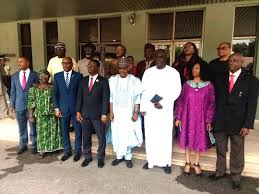563
Daniel Adaji
Nigeria and The Gambia are exploring deeper institutional partnerships aimed at improving public service delivery across both nations. This was the focus of a high-level exchange visit by senior Gambian officials to Nigeria’s Bureau of Public Service Reforms (BPSR) in Abuja on Tuesday.
Welcoming the delegation, Director-General of BPSR, Mr. Dasuki Arabi, said the visit marked a commitment to “sharing ideas for best practices, exploring capacities to address peculiar challenges, and building collaboration for institutional capacity.”
He praised the Government of The Gambia for choosing Nigeria as a study destination and acknowledged Prof. Victor O. Ayeni, Chief Executive Officer of GMSI Consult, for facilitating the engagement.
“This to a large extent signals our collective commitment to entrench best practices towards overhauling reforms in our home countries and embrace global best practices,” Arabi said.
He highlighted Nigeria’s reform journey since the post-colonial era and noted that “the public service remains the essential medium through which goods and services are delivered to the people,” with about 20 per cent of the nation’s 200 million population engaged in the sector.
To coordinate its reform agenda, Arabi explained, the Federal Government established the BPSR in 2004, which developed the National Strategy for Public Service Reforms (NSPSR) in 2007.
“The underlying objective of the NSPSR is to create an institutional and governance environment that enables public institutions to deliver public goods and services with integrity, transparency, and accountability,” he said.
The DG added that the current Nigerian administration has introduced several initiatives, including the Renewed Hope Agenda and the Financial Inclusion Policy, both aimed at driving economic reform and enhancing service delivery.
Leading the Gambian delegation, Mr. Sherif Jallow, Permanent Secretary at the Ministry of Public Service Reforms, said Gambia’s reforms, which began in 2018 and extend through 2027, focus heavily on administrative systems and human resources.
He emphasised the importance of institutional convergence and sought insights from Nigeria’s reform experiences.
“We want to learn how Nigeria is managing these reforms, especially around automation, pension fund investment, and service delivery frameworks,” Jallow noted.
Discussions between the delegations covered a wide range of topics, including the automation of payroll and pension systems, the management of inactive staff, and the need for real-time updates for government workers.
The Gambian team also inquired about Nigeria’s succession and mentorship systems in civil service, raising concerns about retaining technical staff and addressing pay scale disparities.
“We are interested in adopting Nigeria’s structured approach to succession planning to improve continuity in our civil service,” Jallow said.
The meeting also explored digital transformation efforts.
“We would like to understand Nigeria’s AI adoption plan and how it supports the government’s service automation strategy,” he added.
Arabi emphasised that such exchanges strengthen regional ties and promote mutual growth.
“This visit has paved the platform for exploring more areas of collaboration… and foster regional diplomacy within the West African coast,” he said.
The Gambian delegation is scheduled to visit select Ministries, Departments, and Agencies (MDAs) to gain deeper insight into Nigeria’s public service reform milestones.



